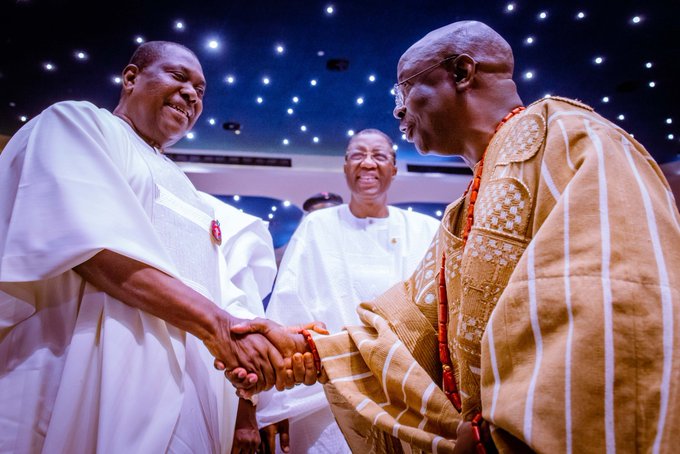President Bola Tinubu has acknowledged the hardships facing Nigerians, but he reassured the nation that his government is on the right track to solving the country’s economic problems.
Speaking through the Secretary to the Government of the Federation, George Akume, at a service marking the 70th birthday of Pastor Tunde Bakare in Lagos, Tinubu emphasized that solving Nigeria’s economic difficulties will take time, and solutions cannot be as quick as people may expect.
“The President acknowledges that times are hard, but at the end of the tunnel, there is always light,” Akume said on behalf of Tinubu. “Solutions to complex problems can never be as instant as coffee, but we are on the right track.”
The Struggle: Economic Challenges and Reform
The message comes at a time when many Nigerians are grappling with significant economic difficulties. The challenges stem from recent government reforms, including the removal of fuel subsidies and the decision to float the Naira currency.
These measures, which have sparked public outcry due to their immediate impact on prices and daily living costs, are part of the government’s broader strategy to revive the nation’s economy.
While acknowledging the tough realities, Tinubu’s spokesperson was clear that these reforms are necessary steps toward long-term recovery.
“The country is making necessary progress,” Akume said. “The reforms are hard, but they are steps in the right direction.”
A Vision for Hope Amidst the Struggle
In his tribute to Pastor Bakare, a prominent spiritual leader and advocate for justice, Tinubu reminded Nigerians of the importance of hope in times of hardship. He described Bakare as “a beacon of hope and a voice for the voiceless,” underscoring his role in promoting justice and integrity in the country.
“Pastor Bakare, fondly called P.T.B., has been a beacon of hope and a voice for the voiceless in our society,” Tinubu said. “His dedication to justice and his unwavering belief in the power of integrity are qualities that inspire us all.”
The President’s words were meant not only to honor Bakare but also to encourage Nigerians that even during difficult times, leadership and integrity will lead the country to a better future.
The Road Ahead: The Importance of Patience
Tinubu’s speech, delivered through Akume, emphasized that Nigerians must be patient and understanding as the country goes through these tough reforms.
“Solutions take time,” Akume reiterated, aligning with Tinubu’s belief that complex economic issues require sustained effort and careful planning. The President’s administration, he explained, is focused on making the necessary changes to set Nigeria on a stronger economic path, even though the journey may be challenging.
“Reforms are not easy, but they are essential for Nigeria’s progress,” he said.
A Celebration of Pastor Bakare’s Contributions
The event also celebrated the achievements of Pastor Tunde Bakare, whose 70th birthday brought together political, spiritual, and community leaders. Among the dignitaries present were Lagos State Governor Babajide Sanwo-Olu and Ogun State Governor Dapo Abiodun, who praised Bakare’s influence in shaping Nigeria’s political and spiritual landscape.
Both governors acknowledged Bakare’s role in the country’s development, with Sanwo-Olu calling him a “true leader” whose impact goes beyond the pulpit.
Bakare, known for his outspoken views on national issues, has long been a figure of both political and spiritual significance. He has consistently advocated for justice, good governance, and accountability in Nigeria, earning the respect of leaders across the nation.
In his tribute, Akume noted that Bakare’s work as a spiritual guide and a nation builder has left a lasting legacy.
“Pastor Bakare has worked tirelessly for the betterment of Nigeria,” Akume said. “His message of hope and resilience is one that continues to inspire us all.”
A Nation in Transition
While Tinubu’s government faces criticism for the immediate effects of its economic reforms, the President’s message of patience and gradual progress has resonated with many Nigerians who are waiting for the long-term benefits of these changes.
The ongoing reforms, such as the removal of the fuel subsidy and the floatation of the Naira, were seen as necessary to correct economic imbalances but have created a sharp increase in the cost of living for many Nigerians. Despite the backlash, the government is standing firm on its decisions, believing that these steps will stabilize the economy in the future.
“Progress takes time,” Tinubu’s administration has continued to stress. “While these challenges are real, they are part of a larger plan for Nigeria’s economic future.”
As the country grapples with rising fuel prices and a weakened currency, President Tinubu’s leadership and the administration’s commitment to long-term reforms will be tested in the months ahead.

